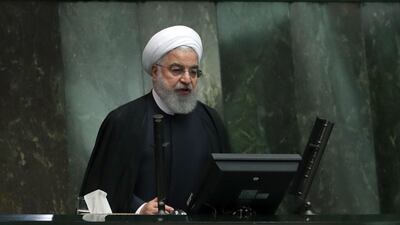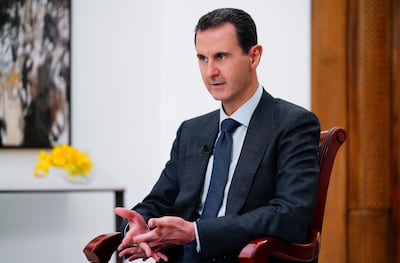The Arab countries whose fates depend on the mood of the authorities in Iran and Turkey will continue to suffer until Turkish President Recep Tayyip Erdogan faces a reckoning for his failed adventurism in the Middle East, and the regime in Tehran adopts real reforms.
The US Congress has slapped sanctions on Ankara for securing a deal for the S-400 air defence system with Russia despite Turkey being a member of Nato. Congress also unanimously recognised the Armenian genocide by the Ottoman Empire more than a hundred years ago, which infuriated Mr Erdogan – particularly since US President Donald Trump himself turned a blind eye to it. The Trump administration is also relatively at ease, as its “maximum pressure” policy has resulted in an economic crisis for Iran and its proxies.
However, the US could yet be dragged into a military confrontation with Iran, a prospect that haunts Mr Trump as he does not want to be involved in a war so close to his tough re-election battle next year. He is still seeking negotiations for a new nuclear deal with Tehran that includes a curb on its ballistic missile programme, not considered in the 2015 agreement signed by predecessor Barack Obama. He also hopes the deal will keep Iranian expansionism into Arab countries – specifically Iraq, Syria and Lebanon – in check. The three countries are essentially bargaining chips Iran could use to negotiate when the time comes but the problem for the regime is that they are all facing internal unrest, which threatens to overturn its gains. Meanwhile, suppressing the protests in these countries could backfire and further weaken it.
Unless a major incident occurs before the end of the year, therefore, the US-Iranian relationship will continue to be determined by a mutual desire to avoid war.
Brian Hook, the US official in charge of the Iranian dossier, has said that if Tehran attacks US interests, his country would respond militarily. Washington’s primary concern is its interests in Iraq, where it is most vulnerable if the Islamic Revolutionary Guard Corps targets its troops stationed there – although such a decision can be made only by Ayatollah Ali Khamenei, Iran’s supreme leader. Speaking at the Council on Foreign Relations, Mr Hook said Iran must either enter negotiations or see its economy collapse, emphasising the effectiveness of the sanctions, which he said have led to a significant reduction in its oil exports.
Concerning the possibility of Iranian military action, Mr Hook’s tone was sharp and clear: “It would be a very big mistake for the regime to make a miscalculation about our resolve.” One US military official said Iranian-backed militias are getting close to a red line but affirmed they would respond forcefully if they crossed it.
Hassan Rouhani, the Iranian president, has said his government is determined to overcome sanctions through various means, including talks. But Lt Gen Hossein Salami, general commander of the IRGC, has threatened “the Americans and their lackeys” with a “strong blow”. While speaking about the unrest in Iran, he went further afield, saying: “The enemies must realise if they don’t stop stirring sedition then the Iranian people will put their interests in the region at risk.”
Through its mission to Iraq, the United Nations has accused “armed entities, militias, outlaws, and unknown third parties” of standing behind the recent wave of killings, kidnappings and arbitrary detentions in the country. At the same time, there is increasing talk of the responsibility of pro-Iranian armed factions integrated into the Iraqi security forces. This organised chaos is very dangerous and Iraq has become a ticking time bomb at the hands of the IRGC. The world is watching, though, and the US is vigilant.
The US is also pressing ahead with its policy of sanctioning Iranian interests in Syria. The Caesar Syria Civilian Protection Act, which imposes new sanctions on Bashar Al Assad, the Syrian president, his regime, its allies and those financing it, has received unanimous support from Congress. The act, which awaits the president’s signature, will also give secretary of state Mike Pompeo the power to gather evidence against those who have committed crimes against humanity in Syria to pave the way for holding them accountable. Interestingly, the act will impose sanctions on foreign individuals who materially support the regime and those who may participate in reconstruction projects involving the regime. This means that the Lebanese who are anxious to do business with the regime must think twice now.
In Lebanon, the IRGC's overconfidence in its ability to contain the revolt has hit a stumbling block, given the reality of the situation in the country and the international scrutiny of its objectives and actions there. According to one observer, "the internal pains in Lebanon will extinguish the calls to emulate the Vilayat-e Faqih system [which transfers all political and religious authority to the Shia clergy]".
Next week David Hale, the US under secretary of state for political affairs, will visit Beirut, carrying a strong message to Lebanon’s officials. He will say that the time for them to address the country’s problems has come, even as the people are demanding the prosecution of officials for corruption, as well as the restoration of looted funds. Interestingly, the Swiss parliament has given Lebanon the right to access data regarding bank accounts in the country, paving the way for restoring these funds.
In short, Iran is growing weaker, more fragmented and isolated. It is still using its regional cards with a sense of arrogance. It is ignoring the other option it has – of reforming the logic of the regime, which says it has the right to spawn loyal militias in sovereign countries in complete disregard of their people’s demands and self-determination. If only it had the wisdom to adjust its behaviour, it would become a influential nation in the region without having to expand beyond its borders.
Raghida Dergham is the founder and executive chairwoman of the Beirut Institute



